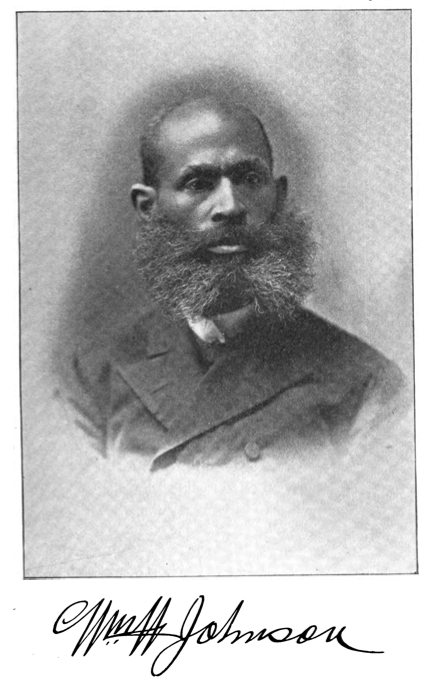
Ages ago I promised to try to tell the story of William Henry Johnson, one of the most remarkable and yet neglected figures in all of Albany’s history, but it became one of those tasks that keeps getting put off because of its sheer enormity. Where do you begin with someone, the first chapter of whose autobiography is titled, “A Brief Sketch of the Life of Dr. William Henry Johnson, of Albany, N.Y., Proves Very Interesting Reading, and Goes to Show What Sheer Pluck Under Adverse Circumstances Can Accomplish.” And so it does. I could try to sum up his life and career, but I couldn’t do it as well as he did:
“Born in Alexandria, Va., of free parents, March 4, 1833, he left home at the age of twelve, with only the education that a Sunday school could give. Four years, ending May, 1850, were spent in Philadelphia, learning the hair-dressing business; he came to Albany, N.Y., in 1851, where with others he was engaged in conducting the ‘underground railroad,’ the object of which was the assistance of fugitive slaves; returned to Philadelphia in 1855. In 1857, became a member of the ‘Banneker Literary Institute,’ and about the same time he, with others, organized the ‘Proscribed American Council,’ which helped to revolutionize public opinion in Philadelphia. July 4, 1859, he delivered an able oration at the celebration in Philadelphia, the first time that colored people participated in such an event. In the same year he was forced to leave Philadelphia to escape imprisonment for having assisted fugitive slaves; went to Norwich, Conn., and was a resident of that place when the war broke out. Not being allowed to enlist as a soldier because of his color, he joined a Connecticut regiment as an independent man and participated in the battles of the first Bull Run, Roanoke and Newbern; his health failing, he returned once more to Albany, N.Y., and became a recruiting agent for the Fourteenth Congressional District. He was a delegate to the National Convention in 1864; drew up the constitution of the New York State Equal Rights Committee; elected Chairman, 1866-73 (re-election declined); drafted an amendment to the Military Code, striking out the word ‘white,’ which was passed in 1872; drafted the Civil Rights bill in 1873, which then became a law; in 1867 he memorialized the constitutional convention to reorganize the fundamental instrument by omitting the property qualification clause which imposed a real estate ownership as a precedent condition to allow colored citizens to vote, and was successful in his endeavor. In 1891 he drafted a bill and secured its passage through the Legislature of this State, abolishing the discriminating, unjust insurance law which permitted the acceptance of colored people upon the same terms with white people, and at death deducted one-third of the face value of the insurance policy, basing this deduction upon the pretense that the longevity of white people was one-third greater than that of black people. In this noted case Dr. Johnson delivered a speech before the legislative committee exposing the fraud perpetrated upon his people by insurance institutions ….
“His life work along these lines culminated in the triumphal enactment into law of the bill passed by the Legislature of 1900, and signed by the Governor (Col. Theodore Roosevelt), which wipes from the statute books of the Empire State the last vestige of racial discrimination. It is the bill known as No. 492, of the Laws of 1900, repealing all laws on the statute books prohibiting the free and equal accommodation of children of African descent in the public schools of this State.”
Not enough to convince you that as Albany residents, we should have heard this man before? Then consider this:
“He was a Freesoiler. In early life, in the days of slavery, he trained with Gerrit Smith, Frederick Douglass, Stephen Myers, John C. Fremont, Bishop Logan, Rev. Henry Highland Garnet, Prof. W. Howard Day, Jacob C. White, Octavius V. Catto and the old anti-slavery party. He attended the first Republican National Convention held in Philadelphia in 1856, where Fremont and Dayton were nominated and Abraham Lincoln secured 110 votes for Vice-President. He was present in 1872, when General Grant was noinated, and also attended the convention this year, when McKinley and the “Rough Rider” were nominated ….
“Dr. Johnson was the first colored man elected to any official place in this State. In 1872 he was elected janitor of the State Senate and served one term of two years. He was also elected janitor of the High Court of Impeachment, consisting of the State Senate and the Court of Appeals, which tried the impeached judges of the Supreme Court at Saratoga in 1873. He was elected in 1887, a State committeeman at large of the Republican State Committee, and in 1888 he was re-elected to the same position by the State Convention held in Buffalo in the spring of that year. No other colored citizen in this State has ever been honored by an election in a State Convention to that position.”
Want to read his whole story? Yeah, me too. Here it is.
Tomorrow: More about Dr. William Henry Johnson.

5 thoughts on “The Autobiography of William Henry Johnson”